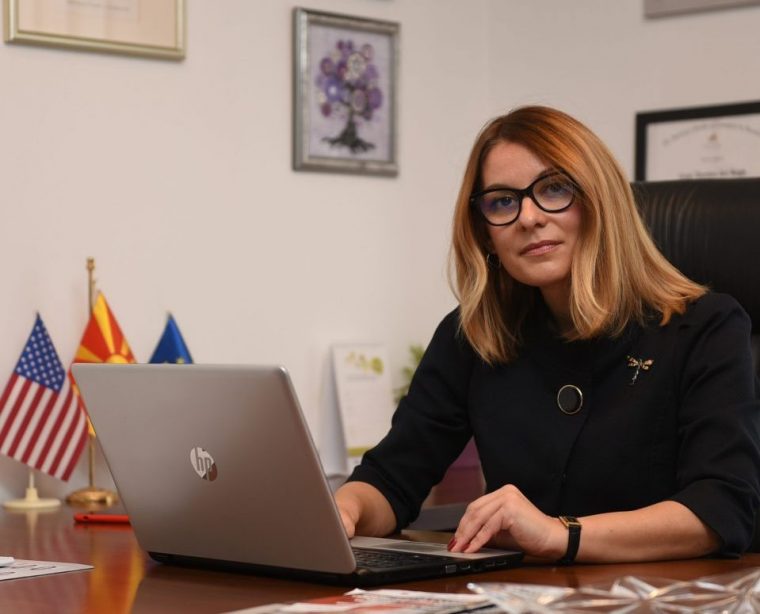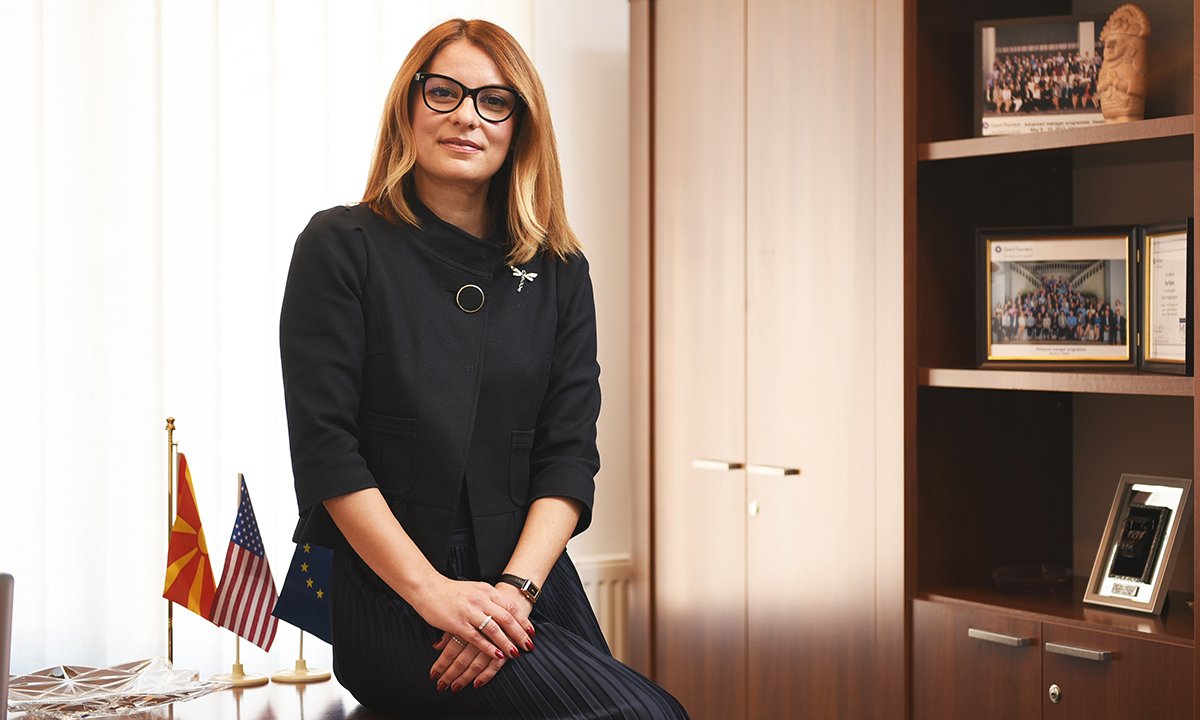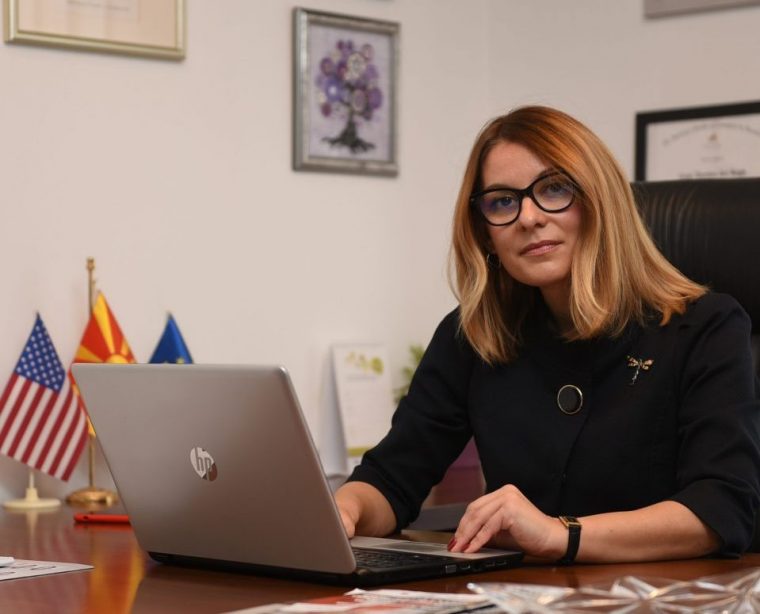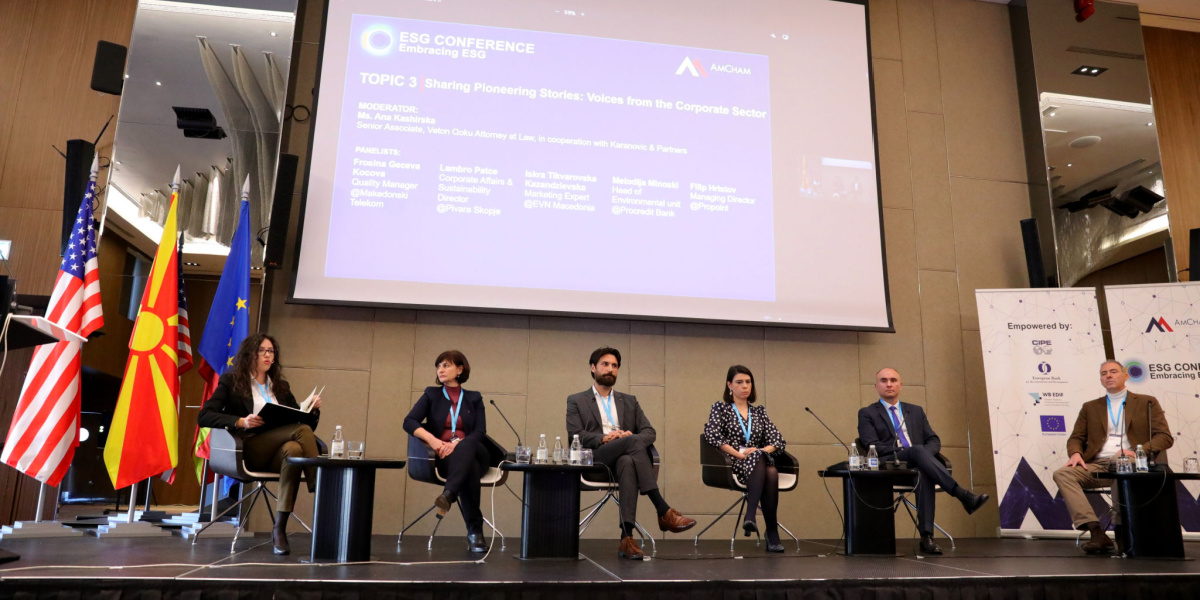Interview with Maja Filipceva, AmCham President, Head of Tax and Outsourcing Grant Thornton for Kapital Magazine
“Today AmCham counts 132 members: multinational companies, domestic businesses, and NGOs, which means highly diversified membership. I believe that the first thing that distinguishes us from the other chambers of commerce is the size of a company in terms of knowledge, way of thinking/management, technical-technological readiness, attitude towards employees, care for the community and the environment, and then we are absolutely talking about a chamber of large companies.”

- The American Chamber of Commerce in North Macedonia celebrated its 20th anniversary. How was the Chamber established and what do 20 years of market experience mean?
This year, the American Chamber of Commerce celebrates 20 years of its existence, making it one of the “oldest” chambers in the country. The idea behind the establishment was prompted by the need of companies, especially those representing American companies, to have their own platform to collaborate in order to increase business participation in the process of creating economic policies, improving the business climate in the country, as well as increasing and strengthening economic cooperation between the United States of America and North Macedonia.
As a result, in September 2000, seven representatives of various companies, Ms. Verica Hadzi Vasileva-Markovska and Mrs. Kristijan Polenak, Mihail Apostolski, Ivan Ralev, Jorgo Kjuka, Antoni Peshev, and Zivko Gruevski, with the support of the US Embassy, established the chamber.
Nine months later, the Chamber counted 89 members, which means that companies quickly recognized the benefits of networking through the newly opened direct channel of communication with economic policymakers.
Over the past 20 years, AmCham has implemented numerous activities and initiatives aimed to improve the business climate in the country and establish good business practices, the rule of law, and transparency of operations. We are talking about 300 events with over 20,000 participants, 200 consultative meetings with economic policymakers, hundreds of publications, and, most importantly shared over 1,000 success stories from our members.
AmCham is one of the first chambers to promote the concept of socially responsible companies as a basis for overall social development, and because of this, we are recognizable for a series of activities related to corporate social responsibility in the field of ecology, education, social development, etc.
For example, I will mention the “Open the Doors” internship program for students coming from low-income families, as well as the appealing and functional sensory garden in the yard of the School for children and youth who are blind or hard of seeing”Dimitar Vlahov” in Skopje.
Through the activities that marked these past 20 years as a Chamber, we have achieved and learned a lot, above all, thanks to the incredible enthusiasm and commitment of our members. The achieved results come from the long-term commitment of AmCham, by building strong partnerships and sustainable relationships, to be the voice of our members, and to contribute to the growth and development of the business sector in the country.
2. AmCham is part of the U.S. Chamber of Commerce Network. How does this network function and how accessible is it to your members?
AmCham North Macedonia is part of the U.S. Chamber of Commerce, which includes over 140 accredited AmCham chambers worldwide. We are also part of the European network of AmCham Chambers that has affiliates in almost all countries in Europe. An interesting fact is that the European Network has 45 offices present in 43 countries in Europe, bringing together 17,000 companies that employ over 20 million people.
AmCham North Macedonia holds regular meetings with partners from the other AmCham Chambers, including participation in events, trainings, lectures, sharing information from the network, visits to other countries, organized visits to business/expo fairs for members, etc. Unfortunately, in the last year, due to the pandemic caused by the COVID-19 virus, there has been a change within the cooperation. But, I would like to point out that with the application of new technologies, the dynamics and activities within the network have expanded and further enhanced the cooperation between offices that leads to additional benefits to all our members.
3. AmCham is known as the Chamber of “Big Companies”. Do you think there is a difference between AmCham and the other Chambers in the country?
Today AmCham counts 132 members: multinational companies, domestic businesses, entrepreneurs, and NGOs, which means highly diversified membership. I believe that the first thing that distinguishes us from other chambers is the size of companies in terms of knowledge, way of thinking/management, technical-technological readiness, attitude towards employees, care for the community and the environment, well then we are absolutely talking about a chamber of BIG companies.
The second thing that is quite specific about AmCham is the way the Chamber works. The operation of AmCham is managed by a Board of Directors, which consists of 7 members, representatives of member companies, with a two-year term and the possibility for re-election, as well as two representatives of the U.S. Embassy who have a consultative function. The Board of Directors is the one that defines the goals, tasks, and the annual strategy of the Chamber. In addition to the Board, the Chamber has committees that define topics of interest to members and articulate them in appropriate proposals, depending on the stakeholders for which they are intended. For that reason, AmCham is a platform through which representatives of companies, volunteering and sharing their time and professional experience, work on establishing common interests, exchanging information, and improving the overall business environment in the country.
Last but not least, are the opportunities that AmCham North Macedonia, as part of the U.S. Chamber of Commerce, has to offer to its members: liaison with member companies of other AmChams, initial information on markets of interest, exchanging knowledge, experiences, and good practices.
4. Today, the words “equality and diversity” are an integral part of our vocabulary. How much is gender equality present in AmCham?
Diversity is good in every sense; it encourages different ideas and opens up new opportunities for development. As a chamber, AmCham advocates and actively works on the advancement of gender diversity and the creation of a favorable climate for an inclusive culture in which a large number of voices are heard. Top leadership form is the key to leading change. There is no declarative policy that can guarantee women’s participation if it’s not applied in the environment in which they are represented. In fact, that makes AmCham different.
By my persuasion, it is of vital meaning the need of implementation of policies and practices by our members for advanced inclusion and for the positive benefits that we can all have from the companies, the public sector, chambers, civil society supporting gender equality. In the past 20 years, 10 women have been part of the Board of Directors, 3 presidents, 7 in the position of executive directors in the Chamber. We do not stop here.
Together with the support of the entire Board of Directors of AmCham, the executive director, and the wider office, this time we will strive to encourage women to take an active part in the future composition of the Board of Directors of the Chamber.
We will achieve this through active work with the leadership of our members to emphasize the importance of gender diversity. Equal participation of women in management is good for an organization where mixed leadership teams outperforming their socially homogeneous competitors. Employing and retaining employees as a strategic priority of businesses remains high on the agenda, and gender equality in management is a key element for a company’s brand in the future.
5. What is the difference between then and now? What does the future hold for AmCham?
The progress of “work from home, virtual meeting rooms, training, conferences” has become a reality in recent months of the corona crisis. Leaders are forced to accept and adapt to virtual reality and to manage it equally successful from a distance. While we all expect offices, markets, borders, and the economy as a whole to reopen, we must not forget what we have learned during this pandemic.
We have all experienced changes in every field over the past year. Basically, our lives have changed for all of us, both personally and professionally. This earthquake did not stop only at the door of the new virtual reality.
Such an environment of insecurity has led leaders to rethink their roles, responsibilities, and work patterns in everyday life. The chairs are less in number, and the agendas have become shorter. As a chamber, AmCham has not remained immune and it has transformed in order to respond ready to all challenges, and that is an obligation and responsibility that we bear equally for all our 132 member companies with over 30,000 employees. In this regard, the Board of Directors of the Chamber has a more focused approach during the Board meetings, placing as a priority the key strategic issues that are urgent for our members.
In the future, as in the past, we will be focused on meeting the needs of our members for bold solutions aimed at advancing the wider society in which we all work and live. We will continue to bridge businesses with policymakers and the civil sector, as the only way of building relationships and trust.
6. What are AmCham’s goals in terms of policy change in the country?
The primary goal, we are striving since the establishment of our Chamber, is based on the rule of law. We request from every Government to work toward ensuring the conditions for continuous respect of the principles for rule of law, equality, accountability in work, wider participation in decision-making, legal certainty, as well as procedural and legal transparency. Through its committees, AmCham actively participates in all activities organized by relevant policymakers in the country, contributing to the promotion of laws that ensure the application of the law without exceptions and discrimination, as well as available political and economic opportunities for all stakeholders in society. We also advocate for consistent and predictable change of policies that reflects real needs and European goals, while providing space for companies and government entities to adopt them.

7. What are AmCham’s activities in terms of legislative amendments, faster adaptation to EU policies, transparency and the rule of law?
As I mentioned earlier, the members determine the initiatives that we all dedicate at a given moment.
The first topic is digital transformation. In order to ensure the development of the economy, the topic of automation and digital transformation must be accelerated. Taking into account the rapid changes that are taking place in this area, our society must first create the preconditions that will lead to the process of automation to enable smooth use of digital technologies and data in all business operations.
Let me share with you a few simple examples that companies are currently facing. The option for an electronic invoice is provided by the Law on VAT from 2018, however, the legislator did not further adopt appropriate regulations that will allow companies to fully implement. Another example is the organization of Assembly through two-way audio and video live communication.
Although the Law on Trade Companies envisions this as a possibility, still, there is an absence of bylaws that enables full implementation. Therefore, companies are faced with uncertainty in their implementation and do not dare to organize their Assemblies in this way.
On the other hand, when we consulted colleagues from Slovenia to see how their parliaments are organized, it turned out that we are one step ahead of them and that in fact, their laws have yet to be adapted to the trends imposed by the digital transformation. In a conclusion, we have laws that need to be further regulated by the institutions with bylaws, in order for companies to have legal certainty to realign on these provisions.
The second topic is the Law on Labor Relations and the need for modernization. Yes, some of the changes that will have to be covered by the Labor Law are related to the digital transformation and the changes in the way of working, but it should also be liberalized in the part of employment and dismissals in a manner that opening of new jobs will be stimulated and investment in human capital will be encouraged as well. Let us not forget at this point the changes that will result from the announced change – Sunday to be a non-working day – which will have serious implications, especially in event of immediate application.
In addition to these two initiatives, we are also working on issues related to free trade agreements, the PEM – Convention, preferential rules of origin of goods, customs tariffs. At the moment, the most pressing issue is Brexit and the free trade agreement with the United Kingdom due to the negative effects on foreign trade with both the United Kingdom and the EU, which will arise from the incomplete resolution of the issue before 1.1.2021.
I believe, it is extremely important to note that it is in our intention to work as a partner to economic policymakers since we only believe that solutions we mutually achieve will have a broader impact on the economy where businesses and people can flourish.
8. How can companies respond to the challenges posed by these times of crisis?
The change is happening faster than ever, which means that challenges and new opportunities are more present. The sudden and unexpected shift in the status quo that we are currently in, is rationalized and often justified in a contradictory way by companies. Adaptation to the crisis situation must be fully understood, accepted as inevitable and properly realized. Even in these times of crisis, companies must remain focused – plan and take appropriate action to offset the effects of the crisis.
In order to be able to adequately respond to new challenges, companies must find appropriate avenues for faster and easier adaptation of their operations to the new conditions imposed by the crisis. Although each industry has its own specifics, there are still elementary rules, of which I will mention only a few, that I think to apply to every business, regardless of the industry they operate:
Employee and job: human capital management
Companies need to increase the care of their employees and set up a policy and system to protect their health appropriate to their business. The protection policy and system should be uncompromisingly implemented and clearly communicated to all employees. The care and preservation of the health of the employees ensure the continuous realization of the work process. Furthermore, care should be taken to adapt and improve the skills and knowledge that employees have, in order to adapt the business to the changed operating conditions, as well as to provide the necessary conditions for its smooth running.
Follow the Government measures
Companies should be constantly up-to-date with the situation, monitor and implement the measures of the Government and other competent institutions.
Re-evaluate the Supply Chain
Many companies face broken or slowed supply chains of components and goods from other markets, so they need to consider what their alternative sources are and how to adjust their approach to inventory management.
9. Do companies have the capacity to recover quickly from the crisis that hit the Macedonian economy?
Now, and also in the future, companies need to build their own resilience, must stay flexible in terms of their plans for continuity of business activities, as well as in terms of steps for possible transformation. They should be prepared to identify the impact of the challenges posed by the crisis and work on at least one scenario that takes into account possible disruptions in labor, distribution, supply, transport, and mobility.
Companies should consider all areas of potential impact, including:
Employees
As I previously mentioned above, we must find ways to manage human capital in changing circumstances, because it is the foundation of every business. Companies should provide protection and support to employees (health care, sick pay, working conditions), nonetheless also to provide opportunities for learning and training of employees based on the real needs of their companies. What additional skills, information, or job training the employees in the company need? Can your IT support department meet the challenge of working from home for everyone?
Customers and markets
How does a pandemic affect demand? How will customers be affected? What are the clients’ needs during this period and how can you help and meet their needs?
Finance
What will the supply and demand distortion bring and what is their impact on the company’s cash flows?
Automation and Digital transformation
Automation is an instrument for achieving goals, and the desired goal is digital transformation. Digital transformation requires companies to review and revise existing processes in order to be more efficient and create new value for customers.
If companies follow the recommendations and actively turn them into a plan, they can be sure that they are ready for the challenges.
10. How is AmCham supporting members in the process of faster and better adjustment in times of crisis?
The more we learn from each other, the faster and more efficiently we can respond to the challenges as individual companies, and through the Chamber, as a team. The support that the Chamber receives from the U.S. Embassy plays an important role and we are especially grateful for that.
Furthermore, our commitment is to continue to be involved in the processes for prompt and efficient adjustment in times of crisis, also our task is to be active supporters of changes. We stand for good business policies that create jobs and economic recovery through effective lawmaking and enforcement.
We encourage our members to increase their support to the communities in which they work and live by providing innovative, good, and informative services. In this way, we strive to strengthen our presence as a Chamber and to further enhance our relationship with society as a whole.
AmCham is one of the most renowned chambers in North Macedonia that represents the interests of businesses of all sizes, sectors, and regions. We all share one thing – we believe that the Chamber is the voice of business, and I as President, together with the Board of Directors, will work to contribute for AmCham to have an active impact on the economy where businesses and people can develop and grow.





